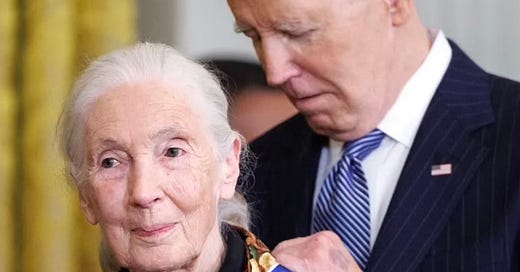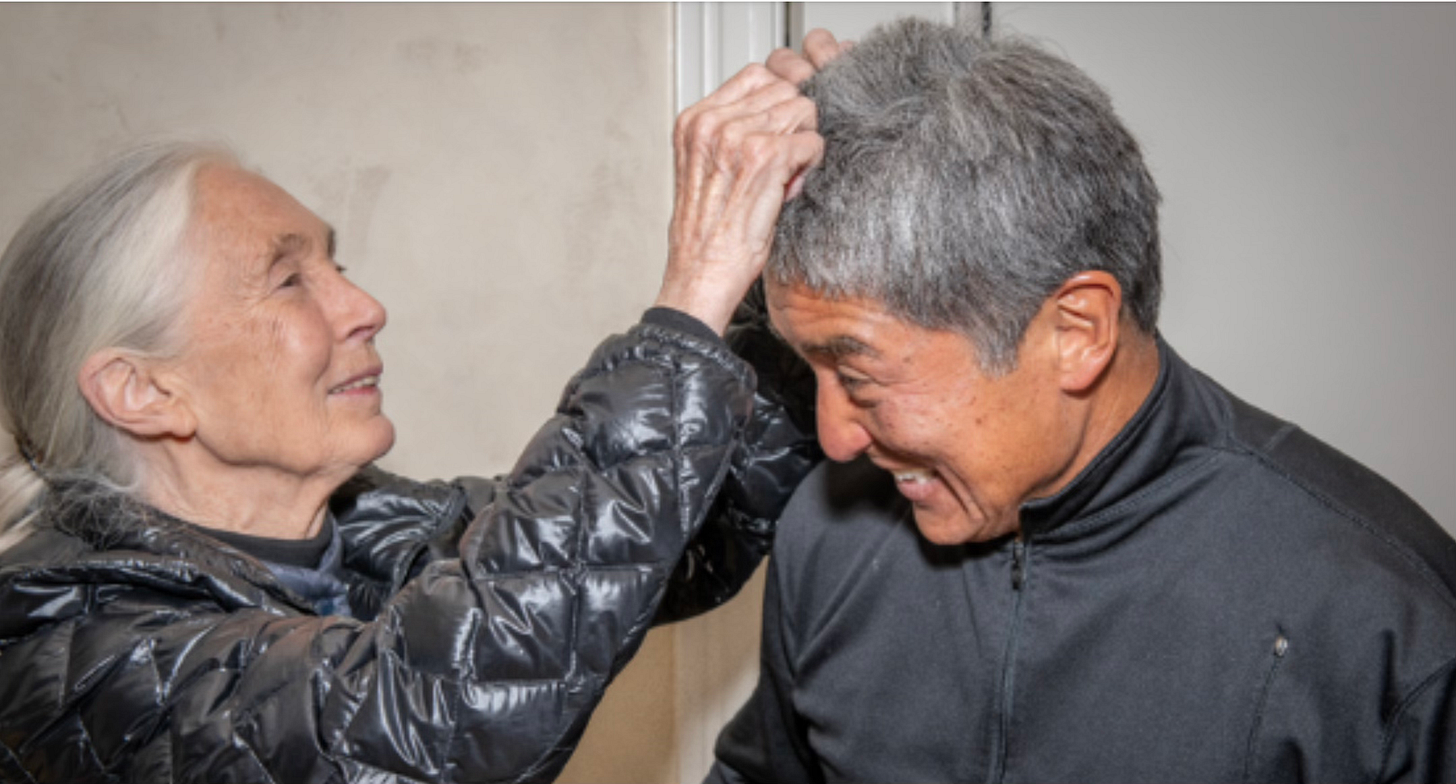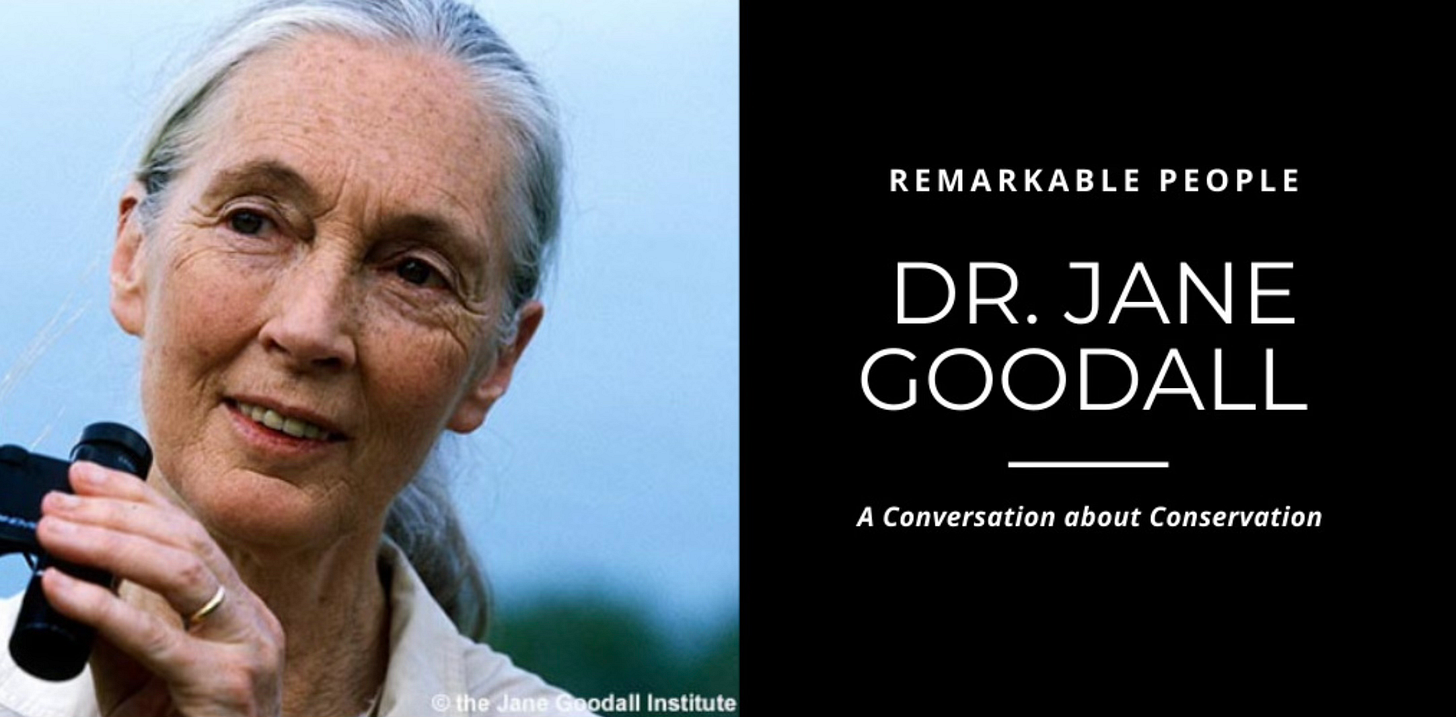There are moments in life when you meet someone who fundamentally changes how you see the world. I’ve had the privilege of interviewing Jane Goodall on my podcast twice, as well as interviewing her for TED.
In my book Think Remarkable, there are three themes: Growth, Grit, and Grace. Jane is the perfect example of each one of these.
I can’t think of anyone better for President Biden to give a Presidential Medal of Freedom though I have to say that Tony Fauci would be right up there too.
Her life story isn’t just about scientific discovery—it’s about the power of following your dreams with unwavering determination, challenging conventional wisdom with gentle persistence, and never losing hope in the face of overwhelming odds.
When a young Jane Goodall first stepped into Tanzania’s Gombe Stream National Park in 1960, she carried nothing but a notebook and binoculars. What she would discover there would revolutionize our understanding of not just chimpanzees, but human nature itself.
Uncovering Primate Truths
At just twenty-six years old, with no formal scientific training, Goodall made observations that shook the scientific world. She documented chimpanzees making and using tools—something previously thought to be uniquely human. Watching a chimp strip leaves from a twig to “fish” for termites, she showed us that humans weren’t the only toolmakers in the animal kingdom.
But her revelations didn’t stop there. Goodall discovered that chimpanzees weren’t the peaceful vegetarians scientists had assumed them to be. They hunted, they fought, and they even engaged in a form of primitive warfare between groups. These findings forced us to reconsider our own evolutionary history and nature.
Breaking Scientific Boundaries
Perhaps equally revolutionary was Goodall’s research method itself. Rather than maintaining the cold, clinical distance expected of scientists at the time, she gave her study subjects names instead of numbers. She acknowledged their distinct personalities, emotions, and family bonds. Initially criticized by traditionalists, her empathetic approach has since been vindicated and widely adopted in animal behavior studies.
Expanding Her Mission Beyond the Forest
What began as a study of chimpanzees evolved into something far greater. As Goodall witnessed the destruction of chimpanzee habitats and the decline of their populations, she realized she couldn’t remain in her beloved Gombe forever. In 1977, she founded the Jane Goodall Institute, expanding her mission from research to conservation and education.
Today, at over ninety years old, Dr. Goodall travels globally around 300 days each year to spread her message of hope for our planet, inspiring audiences through speaking tours, media engagements, written publications, and a wide array of film, television, and podcast projects. She’s got grit!
Lasting Legacy
Dr. Goodall’s impact extends far beyond primatology. Her work has influenced fields ranging from conservation biology to ethics, from animal welfare to environmental education. She showed us that the line between human and animal was far blurrier than we’d imagined, and in doing so, helped us better understand both our closest animal relatives and ourselves.
Some of her most profound insights include:
The importance of acknowledging animal intelligence and emotions
The critical role of maternal care in primate development
The complex social dynamics that govern chimpanzee communities
The interconnectedness of environmental, animal, and human welfare
Sharing Hope Through Personal Connection
What makes Goodall truly remarkable is not just her scientific achievements, but her ability to connect with people. She shares her message with warmth, humility, and unwavering hope, even in the face of environmental crisis.
Her famous quote, “What you do makes a difference, and you have to decide what kind of difference you want to make,” continues to inspire millions worldwide.
Moving Forward
As we face unprecedented environmental challenges, Goodall’s message of hope and individual action becomes increasingly relevant. She reminds us that every person has the power to make a difference, and that only by working together can we create the change our world desperately needs.
The story of Jane Goodall is more than just the tale of a woman who studied chimpanzees. It’s a testament to the power of curiosity, persistence, and compassion to change the world. In an era of climate crisis and biodiversity loss, her life’s work offers both inspiration and a practical blueprint for action.
"Every individual matters. Every individual has a role to play. Every individual makes a difference." - Jane Goodall
Tune into Jane’s episodes on my podcast here:
Mahalo!
Guy






